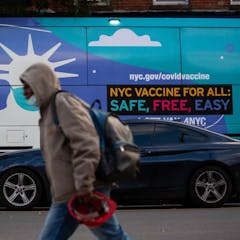
Articles on Social determinants of health
Displaying 41 - 60 of 115 articles

People living in poverty or disadvantage are three times more likely to die from COVID than the wealthy.

One in three children experiences abuse or neglect. These adverse events increase lifelong risks for chronic diseases and mental health issues, creating a public health hazard hiding in plain sight.

Vaccines and medical treatments can only go so far in an unequal society. Facing the ongoing history of racial discrimination and bias in the US would help end the pandemic.

Early intervention programs for young people with psychosis might cost more initially, and require more intensive support for longer periods, but they’re worth the investment.

As lockdowns ease and those who are double-vaccinated gain extra freedoms, we’re likely to see a greater divide between the rich, who tend to have higher vaccination rates, and the poor.

As is the case in other conflict and war situations, it was difficult to collect public data. So we examined tweets to understand what topics were being discussed.

Early life influences have been linked to higher risk of suicide later in life. Reducing those risks, and boosting resilience in children exposed to them, may help reduce suicide rates.

We owe it to Aboriginal people living near uranium mines to learn more about what’s making them sick.

Despite it’s smug title, and a few possible flaws, Norman Swan’s new book – So you think you know what’s good for you? – has lots of welcome common sense and evidence-based tips for living healthier.

Using a technique called admixture mapping, researchers can leverage the diversity of people with mixed ancestry to look for hard-to-find genetic risk factors for diseases like Alzheimer’s disease.

Black residents of Shelburne, N.S., spent decades living near a dump, worrying about its possible connection to elevated cancer rates. A new study will investigate the dump’s long-term consequences.

The course offers a model for teaching about complex problems, and underlines the critical role of university learning, research and outreach in understanding and addressing them.

Social inequalities worsen storm damage and challenge disaster recovery, increasing class divides over time.

Evidence shows that many Black Americans experience police killings of unarmed Black people – even those they do not know – as traumatic events, causing acute physical and emotional distress.

The social restrictions of the COVID-19 pandemic have illustrated how important human connections are to health.

Beyond the ‘literature of madness,’ the narratives about mental and physical health published today explore the interdependence of bodies and their environments.

Transcript of Don’t Call Me Resilient, Episode 5: Black health matters

When COVID-19 first appeared, some called it the great equalizer. But the facts quickly revealed a grim reality: COVID-19 disproportionately impacts racialized communities.

While many institutions pledged their support for anti-racism work this summer, a health researcher says these ideas need to go further to address the long-term health impacts of internalized racism.

COVID-19 has shown the flaws of a reactive health-care system designed to care for people who are already sick. A preventive approach would be more equitable, less expensive and keep us healthier.
